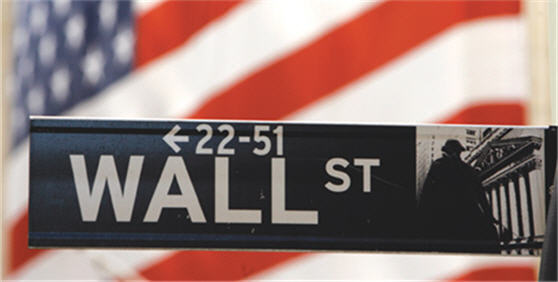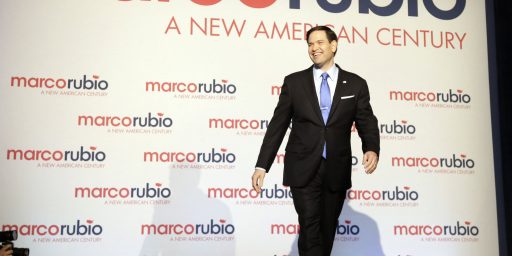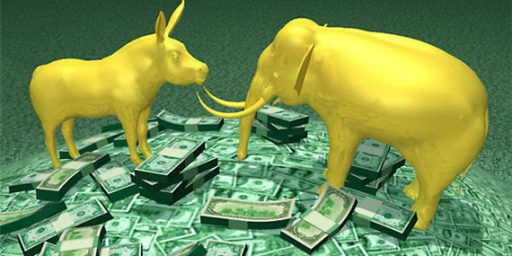Democrats Seeing Wall Street Backlash?
Two widely-hyped reports have Wall Street firms donating less money to Democrats as payback for financial reform efforts. But a closer look reveals no such thing.
Two widely-hyped reports have Wall Street firms donating less money to Democrats as payback for financial reform efforts. But a closer look reveals no such thing.
Politico‘s Ben White (“Wall St. plans payback for reg reform“):
With the financial reform bill likely to hit President Barack Obama’s desk in coming weeks, Wall Street’s top political players are warning Democrats to brace themselves for the next phase of the fight: the fundraising blowback.
Democrats who backed the bill are finding big banks far less eager to host fundraisers and provide campaign cash heading into the tightly contested midterm elections this fall, insiders say.
Some banks, in fact, have discussed not attending or hosting fundraisers at all for the next few months. Goldman Sachs is already staying away from all fundraisers, according to two sources. The company would not comment.
“I think at least in the short term there is going to be a great deal of frustration with people who were beating the hell out of us — then turning around and asking for money,” said a senior executive of a Wall Street bank.
One member coming in for special criticism: Sen. Kirsten Gillibrand (D-N.Y.), viewed as largely unwilling to publicly defend her home state’s top industry but who continues to make fundraising requests, according to Wall Street insiders.
“Sometimes their chutzpah just has no bounds,” an executive said, referring to Gillibrand, who is on the ballot this fall. “People like her who didn’t stand up for us at all during the debate are certainly going to feel some pushback.”
T.W. Farnam and Paul Kane for WaPo (“Democratic campaign committees losing big Wall Street donors“):
A revolt among big donors on Wall Street is hurting fundraising for the Democrats’ two congressional campaign committees, with contributions from the world’s financial capital down 65 percent from two years ago.
The drop in support comes from many of the same bankers, hedge fund executives and financial services chief executives who are most upset about the financial regulatory reform bill that House Democrats passed last week with almost no Republican support. The Senate expects to take up the measure this month.
This fundraising free fall from the New York area has left Democrats with diminished resources to defend their House and Senate majorities in November’s midterm elections. Although the Democratic Senatorial Campaign Committee and the Democratic Congressional Campaign Committee have seen just a 16 percent drop in overall donations compared with this stage of the 2008 campaign, party leaders are concerned about the loss of big-dollar donors. The two congressional committees have raised $49.5 million this election cycle from people giving $1,000 or more at a time, compared with $81.3 million at this point in the last election.
[…]
Reasons for the plummeting donations include concern about the economic recovery and the personalities of the campaign committee leaders, Democratic experts say. But the overwhelming factor is the rising anger among financial executives who think they have not been treated well based on their support of Democrats over the past four years, according to lawmakers, party strategists and fundraisers. Several of the party’s biggest New York donors declined through spokesmen to be interviewed. Some Democrats say pushing Wall Street reform is more important than any slippage in political donations.
None of this would be surprising if political contributions worked the way they do in theory, with firms and individuals casting their support to politicians and parties who they think best serve their interests. But, in reality, major corporate donors tend to hedge their bets to curry favor with those with the power to regulate them, regardless of party. Indeed, they typically donate to both candidates in a competitive race.
Further, given that Wall Street was at the heart of the financial crisis, we would expect aggregate donations to have plummeted compared to two years ago, before the crisis was at its worst. Especially since this is an off-year election — and one in which Democrats are widely expected to get hammered! — compared to a much more competitive presidential cycle in 2008.
Deep into his provocative article, Smith tells us:
Signs of the shift of Wall Street cash away from Democrats this election cycle began to emerge this spring. In an analysis in April, the Wall Street Journal found that 52 percent of political giving by the 12 largest banks on Wall Street went to Republicans, a reversal from last year.
In the first 15 months of the most recent midterm cycle, in 2006, the Democratic and Republican parties — including candidates and campaign committees — each received $20 million from employees of securities and investment firms, according to an analysis done for POLITICO by the Center for Responsive Politics. During the first 15 months of the current cycle, Democrats raised close to $27 million from the industry — an increase probably attributable in part to the fact that Democrats hold the White House and both houses of Congress. But, despite being largely shut out of power, Republicans have raised $19.5 million this cycle, the CRP study found.
So . . . Democrats — who were in the ascendancy — increased their take in the previous cycle and are seeing a very modest return to the normal pattern in a year in which they’re extremely uncompetitive?
According to the center’s executive director, Sheila Krumholz, the Democrats’ recent advantage with Wall Street money could shrink further because the GOP is now viewed as having a better shot at taking back the House and because of blowback from the financial reform bill.
But that wouldn’t be a backlash but rather a shrewd analysis of where the smart money is. One doesn’t hedge one’s bets when faced with a sure thing.
Farnam and Kane bury this well beyond the point where most would have stopped reading:
Republicans, aware of Wall Street’s unease with their former Democratic allies, have tried to reap the benefits, to mixed results. Senate Minority Leader Mitch McConnell (Ky.) and Sen. John Cornyn (Tex.), chairman of the National Republican Senatorial Committee, made a much-touted trip to New York in April, and House Minority Leader John A. Boehner (Ohio) lunched with Dimon in late January.
The two Republican committees that are focused on congressional races have received $2.7 million from the New York area, slightly more than at this point in 2008 but less than the $4 million they raised at this point in the 2004 cycle when the party still controlled Congress.
The two Democratic committees also have more money on hand than their rivals for this fall’s elections — $46.2 million compared with $30.2 million.
“We’re aiming for parity,” said Rep. Pete Sessions (Tex.), chairman of the National Republican Congressional Committee. He has a long way to go. Sessions had $12 million in the bank at the end of May, while the DCCC had $28.6 million. But Sessions finds himself in far better shape than his predecessor, who trailed Democrats by 8 to 1 in ready cash for the five-month sprint to finish the 2008 campaign season.
Again, that ain’t a backlash. And there’s more:
“There’s something fundamental going on, which is a complete disaffection with the committees,” said one New York donor in the finance industry who raised about $3 million for Democrats in the 2008 cycle. The fundraiser, who spoke on the condition of anonymity to discuss the Democrats freely, said progressive donors were reluctant to give the party committees money out of belief that they often back the more conservative candidates. “Progressives have been throwing up their arms,” the fundraiser said. “There’s a tremendous amount of disaffection with the administration and how the caucuses have performed — or not performed.”
Now that’s a backlash, but not against Democrats and not against finreg. Rather, it’s yet another data point in a long trend away from strong political parties. With corporations recently freed from spending limits in individual races by the Supreme Court, one would expect that to take off.







Revolution ain’t what it used to be. 52% is hardly manning the barricades.
I’m not sure it’s clear who the winners are in this bill, or the losers.
For a “backlash” things probably need to be a little more clearly defined.
Politico specializes in making stuff up.